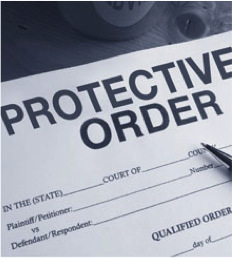All fifty states and the District of Columbia have statutes for some form of protection order (also called protective order or restraining order) (Findlaw.com, 2014), a legal order issued by a state court that requires one person to stop harming another person (WomensLaw.org, 2015). A protection order may include many different provisions, including:
 No Contact Provision: Prohibiting the abuser from calling, texting, emailing, stalking, attacking, hitting, or disturbing the victim.
No Contact Provision: Prohibiting the abuser from calling, texting, emailing, stalking, attacking, hitting, or disturbing the victim.- Peaceful Contact Provision: Permitting the abuser to peacefully communicate with the survivor for limited reasons, including care and transfer for visitation of their child[ren].
- Stay Away Provision: Ordering the abuser to stay at least a certain number of yards or feet away from the survivor and/or her/his home, job, school, and car. The stay-away distance can vary by state, judge or the lethality of the situation.
- Move Out Provision: Requiring the abuser to move out of a home shared with the victim.
- Firearms Provision: Requiring the abuser to surrender any guns he or she possesses and/or prohibiting the abuser from purchasing a firearm.
- Counseling Provision: Ordering the abuser to attend counseling, a batterer's intervention program, or anger management.
Protection orders may cover, in addition to the survivor, children, other family members, roommates, or current romantic partners of the survivor. The same no contact and stay away rules may apply to the other listed individuals, even if the direct harm was to the survivor. Some states allow pets to be protected by the same order, as abusers may harm pets as part of their abusive patterns. Some states include as part of the protection order visitation and custody for children of both the survivor and abuser. These are generally temporary and can be modified by divorce or other future family court orders. Also, many states permit a judge to order, in her/his discretion, anything else that s/he believes is necessary for the safety of the survivor. State law dictates what evidence may be presented at the hearing and how the abuser is notified of the filing of the protection order.
A protection order can generally be obtained by first filing the required legal papers in the appropriate court, typically in the county where either party lives or where the abuse occurred. In many courts, after a survivor files the initial paperwork, a temporary protection order is granted until a hearing is held, during which a final protection order can be granted. For more information on state laws and procedures surrounding protection orders, please see the resources below or contact your local court. To locate the appropriate court in which to file, visit the “Courthouse Locations” page on WomensLaw.org and select your state from the drop down menu.
The resources below include manuals and guides on best practices for representing survivors in protection order cases, as well as summaries of state laws surrounding protection orders.
The National Center on Protection Orders and Full Faith & Credit (NCPOFFC), a project of the Battered Women’s Justice Project, provides technical assistance and training on protection orders, the Full Faith and Credit (FFC) provision of the Violence Against Women Act (VAWA), and inter-jurisdictional enforcement of protection orders. NCPOFFC provides problem-solving technical assistance and training to individuals and jurisdictions on the following:
- Identifying and resolving systemic problems in local procedures for issuance, service and enforcement of protection orders.
- Inter-jurisdictional enforcement of protection orders.
- Child custody provisions within protection orders.
- Federal and state firearms prohibitions related to domestic violence.
- Federal domestic violence and stalking crimes.
WomensLaw.org
WomensLaw.org, a signature project of the National Network to End Domestic Violence, harnesses the power of the internet to reach victims of domestic violence, sexual assault, and stalking. WomensLaw.org provides plain-language, easy-to-understand legal information about laws related to protection orders, custody, immigration, and much more for 54 U.S. states and territories; much of this information is in Spanish as well. WomensLaw.org also has non-legal information about the different forms of abuse, how to stay safe, and contact information for legal and non-legal resources in every state that help victims of abuse, and more. WomensLaw.org also offers a confidential Email Hotline where victims, their loved ones, and advocates can seek information in English or Spanish and receive an individually tailored response within one to five business days.
Break the Cycle is the leading national nonprofit organization providing comprehensive dating abuse programs exclusively to young people ages 12 to 24. Break the Cycle believes every young person has the right to a safe and healthy relationship, but not every state defines dating violence or dating abuse in the same way. As a result, not every state provides the same protections for minors suffering from abuse.
Know Your Rights provides the following information:
- What Legal Protections Does A Minor Have?
- How Can A Legal Service Provider Help?
- What is a Protection Order?
- What About Mandatory Reporting?
In 2011, Break the Cycle partnered with loveisrespect.org, a project of the National Domestic Violence Hotline. Loveisrespect’s mission is to engage, educate and empower young people to prevent and end abusive relationships. Highly-trained peer advocates offer support, information and advocacy to young people who have questions or concerns about their dating relationships. As part of its services, loveisrespect offers legal help for youth surrounding the following issues:
- Calling the Police
- Documenting Abuse
- Restraining Orders
- LGBTQ Relationships and the Law
- Help for Undocumented Immigrants









